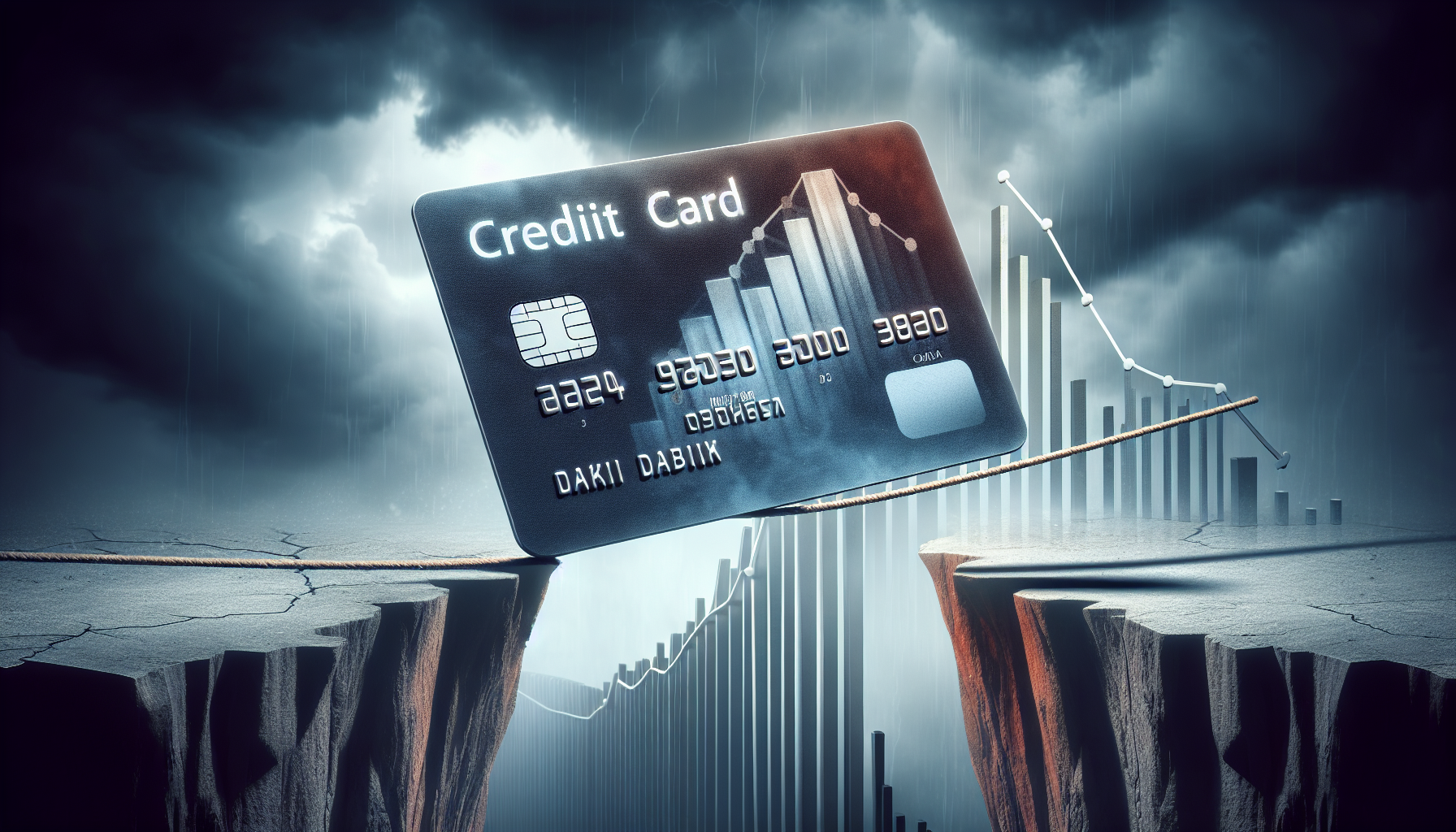
- Insurance
-
-
Most Popular
-
-
- Investing
-
-
Most Popular
-
Best Of
-
-
- Banking
-
-
Best of
-
Banking Reviews
-
Explore More
-
-
-
- Loans
-
-
Most Popular
-
Explore more
-
-
- Credit Cards
- Reviews
- Making Money
Top Habit to Avoid: What Habit Lowers Your Credit Score?
Ever wondered what habit lowers your credit score? One key habit is making late payments on your bills. In this article, we will explain how this and other common habits can impact your credit score and what steps you can take to avoid them.
Written by:
Key Takeaways
- Making late payments can significantly lower your credit score, with effects lasting up to seven years; ensure timely bill payments to avoid this impact.
- Using more than 30% of your credit limit increases your credit utilization ratio, which can negatively affect your credit score; aim to keep it below 30%, ideally closer to 10%.
- Frequently applying for new credit accounts leads to multiple hard inquiries on your credit report, which can collectively lower your credit score; limit new credit applications and consider rate shopping within a short period.
Table of Contents
Making Late Payments
Ever dismissed a credit card bill, assuming a slight delay won’t hurt? You might want to reconsider. That seemingly harmless late payment can be a financial blunder, impacting your credit history and potentially diminishing your credit score by a significant 100 points or more. Given that payment history significantly contributes to your FICO score (35%) and VantageScore (40%), such an impact can be substantial. It’s essential to maintain a good relationship with your credit card company by paying your bills on time.
It all starts when late or missed payments hit your credit report, typically 30 days after the initial missed deadline. And, much like an unwanted guest, it lingers for seven long years, continually reminding lenders of past missteps. The severity escalates with duration; 30, 60, 90, to a dire 120 days overdue, at which point creditors may write off the debt, leaving a mark that’s as stubborn as a coffee stain on a white shirt.
Therefore, strive to pay more than just the minimum payments on time – without fail. Establish automatic payments or set calendar reminders to guarantee your bills are settled ahead of the due date.
Using Too Much of Your Credit Limit

Picture your credit limit as a tightrope. Balancing just the right amount of your available credit can demonstrate to lenders that you’re a financial acrobat, adept at managing your debts and credit lines. Stray too far over the line, though, and you could plummet. The term for this precarious balance is your credit utilization ratio, a critical component that makes up 30% of your FICO score. It’s a measure of the debt you’ve racked up against the credit extended to you.
Crossing the 30% threshold of your credit limit is like sending a flare signal to creditors that you might be struggling to stay afloat financially. This high credit utilization ratio is a red flag for risk and can significantly impact your credit scores. For successful credit management, maintain a low credit utilization ratio—below 30%, but ideally closer to 10%. This approach not only portrays your creditworthiness but also prevents you from sinking into challenging-to-repay debt
Frequently Applying for New Credit Accounts
Have you ever been on a spree, applying for numerous credit accounts, lured by rewards or a sign-up bonus? Caution: each application triggers a hard inquiry into your credit history, nudging your score downward. While a single inquiry might shave off only a few points, a flurry of applications can take a much more significant toll. These hard inquiries linger, remaining on your credit report for a full two years.
Opening several new credit accounts in a short span is akin to sounding the alarm bells of risk to financial institutions, as it may suggest financial desperation or taking on too much credit. It’s a common misconception that more accounts equate to a better credit mix; in reality, it’s the responsible management of a few that counts. If seeking better rates, it’s advisable to concentrate on rate shopping for auto, mortgage, or student loans within a limited period. Credit scoring models typically treat this as a single inquiry.
Closing Old Credit Accounts
You might think that closing credit accounts, especially old and rarely used ones, helps clean up your financial profile. However, this action can unintentionally decrease your available credit, increase your credit utilization ratio, and negatively affect your credit score. This is an unexpected pitfall where an attempt to simplify can inadvertently harm your credit health.
Old accounts carry weight, representing a history of creditworthiness that can work in your favor.
Defaulting on Loans
Consider defaulting on a loan as hitting a financial iceberg—it’s a colossal event with repercussions that can sink your credit score to the depths. When you default, not only does the unpaid balance and interest come due all at once, but you also forfeit any flexibility in managing the debt. The fallout is extensive: from wage garnishment to legal actions, it’s a whirlwind that can sweep away your financial stability.
Cosigning Loans with Delinquent Borrowers
Cosigning a loan binds your financial destiny to another individual—a noble act, but risky. If the primary borrower defaults or misses payments, your credit score could suffer. This decision necessitates an assessment of the borrower’s reliability and your readiness to accept potential liabilities.
Allowing Accounts to Go to Collections
Neglecting overdue bills until they reach collections is like letting a small leak sink a large ship. Collection accounts tarnish your credit report and can significantly lower your credit score for seven years. The effect varies with the scoring model, but it’s always detrimental, and even settled collections can leave a permanent mark.
Settling Debts for Less Than Owed
While settling a credit card debt for less than what you owe may appear to be a smart financial move at first glance, it can significantly impact your credit score. Even though it may alleviate immediate financial constraints, it sends a message to prospective lenders that you may not fully meet your obligations.
The aftermath is a ‘paid-settled’ mark on your credit report, serving as a reminder of the compromise for seven years to come.
Declaring Bankruptcy
Declaring bankruptcy is a financial full-stop, a measure that can erase debts but also decimate your credit score. The repercussions are long-lasting, with the mark enduring on your credit report for 7 to 10 years, depending on the chapter filed. It’s a step to be considered only when all other avenues have been exhausted, as its shadow looms large over future credit opportunities.
Ignoring Inaccuracies on Your Credit Report
Overlooking inaccuracies on your credit report is akin to ignoring cracks in the foundation of your home—it may not seem urgent until it undermines the whole structure. Regular checks and disputes are the tools at your disposal to ensure the integrity of your credit report and, by extension, your credit score.
Thanks to technological advancements, monitoring your credit history is more convenient than ever, with platforms like myEquifax simplifying the dispute process with credit card companies.
Summary
Navigating through the complexities of credit can be daunting, but the journey becomes smoother when you’re equipped with the knowledge of what to avoid. From timely payments to managing credit utilization, and from heeding the details of credit reports to understanding the weight of each financial decision, the habits we’ve discussed are the keystones to building and maintaining a robust credit score. Let this be your compass for financial prudence, guiding you towards a future where credit is your ally, not your adversary.
Quick Questions
A late payment can affect your credit score for up to seven years from the first missed payment, so it’s important to prioritize making payments on time.
It’s better to maintain a small balance, ideally under 30% of your credit limit, to demonstrate responsible credit use. A 0% credit utilization rate may not be ideal as it shows no credit utilization.
Closing unused credit accounts can negatively impact your credit score as it reduces your available credit and can shorten your credit history. It’s generally advised not to close them for this reason.
Ignoring inaccuracies on your credit report can result in a lower credit score. It’s crucial to monitor your report and address any inaccuracies promptly.
Settling a debt for less than the amount owed can hurt your credit score, as it is reported as ‘paid-settled’ and can remain on your report for seven years. It is important to consider the impact on your credit before making this decision.

Join the MoneyMash community!
Sign up to get the latest personal finance news.
© 2025 MoneyMash an Element Road, LLC Company.
MoneyMash is an independent, advertiser-supported site. We may receive compensation when you click to apply for some products using the links that you find on our website. Opinions presented on our website are those of MoneyMash or our team of writers and reviewers who post their own opinions. For more information, please read the full disclosure.
